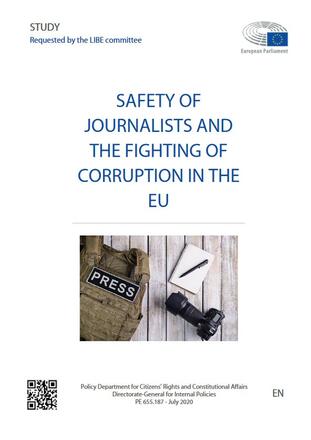
Related contents
SLAPPs: Strategic Lawsuits Against Public ParticipationMedia capture: Toolkit for 21st century autocrats
Disinformation
Whistleblowers: looking for European protection
This research enjoyed the contribution of a number of experts on various issues, such as Linde Bryk (Amsterdam Law School), Silvia Chocarro and Sarah Clarke (ARTICLE 19), Florent Duplouy (Platform to Promote the Protection of Journalism and the Safety of Journalists), Charlie Holt (Greenpeace International), Flutura Kusari (ECPMF), Jessica Machacova (Free Press Unlimited), Jessica Ní Mhainín (Index on Censorship), Lambrini Papadopoulou (Aristotle University of Thessaloniki), Zrinjka Peruško (University of Zagreb), Gill Phillips (Guardian News & Media) and Otto Volgenant (Boekx Law Firm, Amsterdam).
After a very detailed introduction about public watchdogs and democratic society, the changing nature of journalism and of threats to journalists and other media actors, explaining the methodology and the scope and structure of the study, Chapter 2 provides an overview and analysis of current challenges and threats facing journalism, journalists and other media actors today, analysing data from the Council of Europe Platform to promote the protection of journalism and the safety of journalists.
The following chapters give a detailed overview of different European systems of protection (of the European Union, of the Council of Europe, of the OSCE) and of national systems of protection in Denmark, Hungary, Italy, Malta, The Netherlands, Poland, Slovakia, Spain and Sweden.
A thematic focus is devoted do the misuse and abuse of the law (SLAPP) with examples of anti-SLAPP legislation in different EU Member States.
The last two chapters analyse media pluralism and transparency of media ownership, and the Coronavirus crisis, focusing on restrictions on media freedom coming from different sources and approaches (disinformation, deadlines for freedom of information requests, press conferences, verbal and physical abuse).
The conclusions point out how the study has “revealed a number of positive and promising practices in various EU Member States”, but at the same time how “some problematic practices can also be detected across the European Union, such as threats to media pluralism and freedom in Hungary and Poland; a high incidence of SLAPPs in, for instance, Malta (where there are also concerns about impunity and the rule of law), Italy and Spain (where the absence of legislative protection for whistleblowers remains a concern); heavy reliance by politicians on defamation laws to stifle critical reporting, such as in Slovakia (where the discrediting of journalists, including by smear campaigns, is also a problem)”.
Among the recommendations, “continued vigilance is required to ensure effective protection of journalism and the safety of journalists and all other actors who contribute to public debate, paying due attention to the emergence of new threats and the aggravating impact of combinations of threats”.
Tags: SLAPP Safety of journalists Italy European policies and legislation Poland Sweden Malta Denmark Hungary Slovakia Netherlands Spain Access to information Media ownership Media capture Defamation and LibelThe content of this article can be used according to the terms of Creative Commons: Attribution-NonCommercial 4.0 International (CC BY-NC 4.0) . To do so use the the wording "this article was originally published on the Resource Centre on Media Freedom in Europe" including a direct active link to the original article page.

